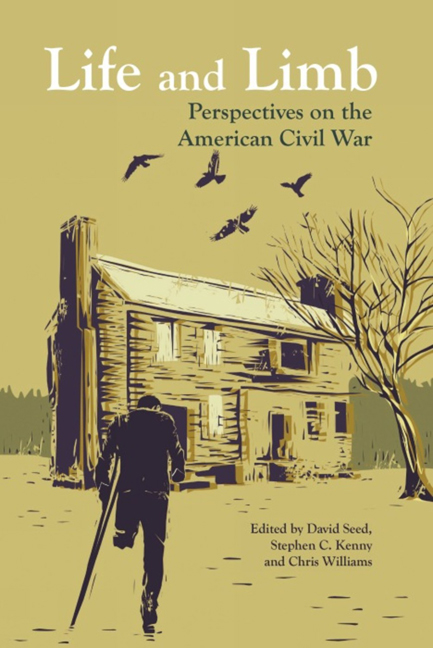Book contents
- Frontmatter
- Contents
- List of Illustrations
- Acknowledgements
- Introduction: Civil War Voices and Views
- MEDICAL AND SURGICAL MEMOIRS
- ACCOUNTS OF NURSING
- With the US Sanitary Commission: On the Hospital Boat Wilson Small: The Other Side of War
- Evacuation from Virginia, 1862: Hospital Transports
- Hospital Routine
- A Death in the Ward: Hospital Sketches
- Nurse and Spy: Nurse and Spy in the Union Army
- Front-line Nursing: Reminiscences of My Life in Camp
- ‘The Mute Look that Rolls and Moves’: Walt Whitman's Civil War
- Specimen Days & Collect
- MEDICAL FACILITIES AND PATHOLOGY
- PHOTOGRAPHY
- AMPUTATIONS AND PROSTHETIC LIMBS
- IN THE FIELD OF BATTLE
- POST-WAR NARRATIVES
- Contributors
- Select Bibliography
- Index
- Plates
Specimen Days & Collect
from ACCOUNTS OF NURSING
- Frontmatter
- Contents
- List of Illustrations
- Acknowledgements
- Introduction: Civil War Voices and Views
- MEDICAL AND SURGICAL MEMOIRS
- ACCOUNTS OF NURSING
- With the US Sanitary Commission: On the Hospital Boat Wilson Small: The Other Side of War
- Evacuation from Virginia, 1862: Hospital Transports
- Hospital Routine
- A Death in the Ward: Hospital Sketches
- Nurse and Spy: Nurse and Spy in the Union Army
- Front-line Nursing: Reminiscences of My Life in Camp
- ‘The Mute Look that Rolls and Moves’: Walt Whitman's Civil War
- Specimen Days & Collect
- MEDICAL FACILITIES AND PATHOLOGY
- PHOTOGRAPHY
- AMPUTATIONS AND PROSTHETIC LIMBS
- IN THE FIELD OF BATTLE
- POST-WAR NARRATIVES
- Contributors
- Select Bibliography
- Index
- Plates
Summary
Walt Whitman (1819–1892) became actively involved in the Civil War in 1862 when he heard that his brother, George Washington Whitman, had been wounded in the Battle of Fredericksburg. Though the injury was only superficial, Whitman stayed on in Washington, visiting the Armory Square Hospital, among others, and tending to the wounded with a missionary zeal. ‘Down at the Front’ was Whitman's only first-hand account of battle and became the basis of his poem ‘A Sight in Camp in the Daybreak Gray and Dim’ (included in Drum-Taps). ‘A Night Battle’ pieces together soldiers’ accounts of the Battle of Chancellorsville and exemplifies Whitman's method of description through cumulative visual detail. ‘Some Specimen Cases’ is, as the title suggests, a series of case notes. ‘The Real War Will Never Get in the Books’ expresses his scepticism about the depiction of the Civil War, which was already by the mid-1860s emerging as a major cultural issue.
Texts taken from Walt Whitman, Specimen Days & Collect (Philadelphia: Rees Welch, 1882). The text of Memoranda during the War (Camden, NJ: author's publication, 1875–76) can be found at http://web.archive.org/web/20080718102114/http://etext.lib. virginia.edu/toc/modeng/public/WhiMemo.html. See also Peter Coviello, ed., Walt Whitman's Memoranda during the War (New York: Oxford University Press, 2004).
DOWN AT THE FRONT
[Lacy House] FALMOUTH, VA., opposite Fredericksburgh, December 21, 1862. – Begin my visits among the camp hospitals in the army of the Potomac. Spend a good part of the day in a large brick mansion on the banks of the Rappahannock, used as a hospital since the battle – seems to have receiv'd only the worst cases. Out doors, at the foot of a tree, within ten yards of the front of the house, I notice a heap of amputated feet, legs, arms, hands, &c., a full load for a one-horse cart. Several dead bodies lie near, each cover'd with its brown woolen blanket. In the door-yard, towards the river, are fresh graves, mostly of officers, their names on pieces of barrel-staves or broken boards, stuck in the dirt. (Most of these bodies were subsequently taken up and transported north to their friends.) The large mansion is quite crowded upstairs and down, everything impromptu, no system, all bad enough, but I have no doubt the best that can be done; all the wounds pretty bad, some frightful, the men in their old clothes, unclean and bloody.
- Type
- Chapter
- Information
- Life and LimbPerspectives on the American Civil War, pp. 47 - 54Publisher: Liverpool University PressPrint publication year: 2015



